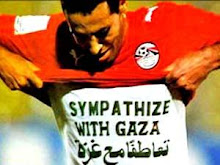
Massive Israeli air raids on Gaza
The missile strikes caused panic in Gaza
Israeli F-16 bombers have pounded key targets across the Gaza Strip, killing more than 200 people, local medics say.
Most of those killed were policemen in the Hamas militant movement, which controls Gaza, but women and children also died, the Gaza officials said. About 700 others were wounded, as missiles struck security compounds and militant bases, the officials added.
Israeli PM Ehud Olmert said the operation "may take some time"- but he pledged to avoid a humanitarian crisis.
"It's not going to last a few days,'' he said in a televised statement, flanked by Israeli Defence Minister Ehud Barak and Foreign Minister Tzipi Livni.
Israel said it was responding to an escalation in rocket attacks from Gaza and would bomb "as long as necessary".
 |
They were the heaviest Israeli attacks on Gaza for decades. More air raids were launched as night fell.
Staff at the main hospital in Gaza say operating rooms are overflowing, it is running out of medicine, and there are not enough surgeons to cope.
The raids came days after a truce with Hamas expired.
Israeli Defence Minister Ehud Barak said "there is a time for calm and a time for fighting, and now the time has come to fight".
But the exiled leader of Hamas, Khaled Meshaal, called for a new intifada, or uprising, against Israel, in response to the attacks.
The movement's Gaza leader, Ismail Haniyeh, said there would be no white flags and no surrender. "Palestine has never witnessed an uglier massacre," he said.
Israel hit targets across Gaza, striking in the territory's main population centres, including Gaza City in the north and the southern towns of Khan Younis and Rafah.
Mr Olmert said "we tried to avoid, and I think quite successfully, to hit any uninvolved people - we attacked only targets that are part of the Hamas organisations".
Ismail Haniyeh Hamas leader in Gaza |
Hamas said all of its security compounds in Gaza were destroyed by the air strikes, which Israel said hit some 40 targets.
Hamas vowed to carry out revenge attacks on Israel and fired Qassam rockets into Israeli territory as an immediate reply.
One Israeli was killed by a rocket strike on the town of Netivot, 20 kilometres (12 miles) east of Gaza, doctors said.
Ceasefire urged
The air strikes come amid rumours that an Israeli ground operation is imminent.
Israeli television said on Saturday evening that Israeli troops were massing on the Gaza border "in preparation for a supplementary ground offensive". The report has not been confirmed by independent sources.
US Secretary of State Condoleezza Rice accused Hamas of having triggered the new bout of violence.
Israeli Prime Minister Ehud Olmert: 'We are not fighting against the people of Gaza'
"We strongly condemn the repeated rocket and mortar attacks against Israel and hold Hamas responsible for breaking the ceasefire and for the renewal of violence there. The ceasefire must be restored immediately and fully respected."
UN Secretary-General Ban Ki-moon also urged an immediate halt to the violence, condemning what he called Israel's "excessive use of force leading to the killing and injuring of civilians" and "the ongoing rocket attacks by Palestinian militants".
Calls for a ceasefire also came from Middle East envoy Tony Blair and the French EU presidency.
Hamas bases destroyed
Palestinian militants frequently fire rockets against Israeli towns from inside the Gaza Strip; large numbers of rocket and mortar shells have been fired at Israel in recent days.
A resident describes the attacks in Gaza
At least a dozen bodies of men in black uniforms were photographed at the Hamas police headquarters in Gaza City.
Mr Olmert appealed to Palestinians in Gaza, saying "You - the citizens of Gaza - are not our enemies. Hamas, Jihad and the other terrorist organisations are your enemies, as they are our enemies.
"They have brought disaster on you and they try to bring disaster to the people of Israel. And it is our common goal to make every possible effort to stop them."
It is the worst attack in Gaza since 1967 in terms of the number of Palestinian casualties, a senior analyst told the BBC in Jerusalem.
Mosques issued urgent appeals for people to donate blood and Hamas sources told the BBC's Rushdi Abou Alouf in Gaza that hospitals were soon full.
In the West Bank, Palestinian Authority President Mahmoud Abbas - whose Fatah faction was ousted from Gaza by Hamas in 2007 - condemned the attacks and called for restraint.
Israel's Haaretz newspaper reported that about 60 warplanes took part in the first wave of air strikes.
Most of the dead and injured were said to be in Gaza City, where Hamas's main security compound was destroyed. The head of Gaza's police forces, Tawfik Jaber, was reportedly among those killed.
Residents spoke of children heading to and from school at the time of the attacks.
Egypt opened its border crossing to the Gaza Strip at Rafah to absorb and treat some of those injured in the south of the territory.
Palestinians staged demonstrations in the West Bank cities of Ramallah and Hebron, and there were some scuffles with Israeli troops there.
Although a six-month truce between Hamas and Israel was agreed earlier this year, it was regularly under strain and was allowed to lapse when it expired this month.
Hamas blamed Israel for the end of the ceasefire, saying it had not respected its terms, including the lifting of the blockade under which little more than humanitarian aid has been allowed into Gaza.
Israel said it initially began a staged easing of the blockade, but this was halted when Hamas failed to fulfil what Israel says were agreed conditions, including ending all rocket fire and halting weapons smuggling.
Source Link









No comments:
Post a Comment